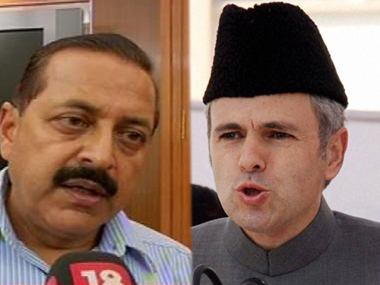Jitendra Singh, Minister of State in the Prime Minister’s Office (PMO), dropped a clanger on Day Two of his job when he talked about the need to rethink Article 370 of the constitution – the article that gives Kashmiris the right to decide which laws legislated by India’s Parliament will apply to them (outside the areas of defence, foreign affairs, communications and such-like subjects). Almost immediately, a political storm broke out in Kashmir Valley, with Chief Minister Omar Abdullah claiming that either the article will remain on the statute book, or Kashmir won’t be a part of India. [caption id=“attachment_1547103” align=“alignleft” width=“380”]  Jitendra Singh and Omar Abdullah.[/caption] This is, of course, political posturing, but Prime Minister Narendra Modi needs to have a rethink on whether Article 370 is aids or hinders his plans to devolve more power to the states. This, after all, is his stated goal, and most chief ministers would want greater economic autonomy from Delhi. In my view, there are two ways to look at Article 370: one, that it is an unnecessary impediment to the true integration of Jammu & Kashmir with the rest of India, and two, it is an imperfect model for devolving more power to Jammu & Kashmir. Article 370 will need tweaks to become a model for devolving power to all Indian states. The truth is article 370 is an anachronism in today’s globalising world, where people and capital move freely pursuing their best interests. The law acts as an impediment to Kashmir’s economic and social integration not only with the rest of India, but the world. Secularists are as confused about Article 370 as the Sangh Parivar. Secularists, for example, pretend that free illegal immigration and movement of people from Bangladesh is fine and any opposition to that is communal even though this has changed the demography in the whole of eastern India. On the other hand, they think Kashmir’s artificial restrictions on Indians and non-Indians owning property or settling there are kosher. Article 370 in its current form promotes Kashmiri xenophobia and does need to be amended. However, there is another angle to Article 370 that is relevant to the whole of India. India is a Union of states. It is a combination of states that makes up India. The states are the primary route to social and economic advancement, but, unfortunately, it is the Centre which monopolises economic resources and imposes it will through one-size-fits-all legislation for all states. Jammu & Kashmir is the only state which does not have to suffer this imposition, thanks to Article 370. If Narendra Modi believes that power has to be devolved to states, and that the Centre must get into a partnership with Chief Ministers, then he should look at how the beneficial aspects of Article 370 can be extended to all states, even while negotiating with the Kashmiris for deleting the negative aspects of a law that prevents the country from becoming one. Article 370 is both a red line drawn across India, and a green one that can bind India by making state borders porous. A diluted Article 370 that is applicable to all states will make India a true federation. The states will then drive India’s growth. Maybe, this is the debate that must begin. How far can Article 370 be extended to other states, and how Kashmiris can learn to live with a more liberal rendering of the law. Article 370 certainly was not intended to artificially insulate Kashmir from the rest of India.
Article 370 insulates Kashmir from central laws that the state does not want. But if states have to be given more autonomy, some form of article 370 needs to be extended to all states.
Advertisement
End of Article
Written by R Jagannathan
R Jagannathan is the Editor-in-Chief of Firstpost. see more


)

)
)
)
)
)
)
)
)



